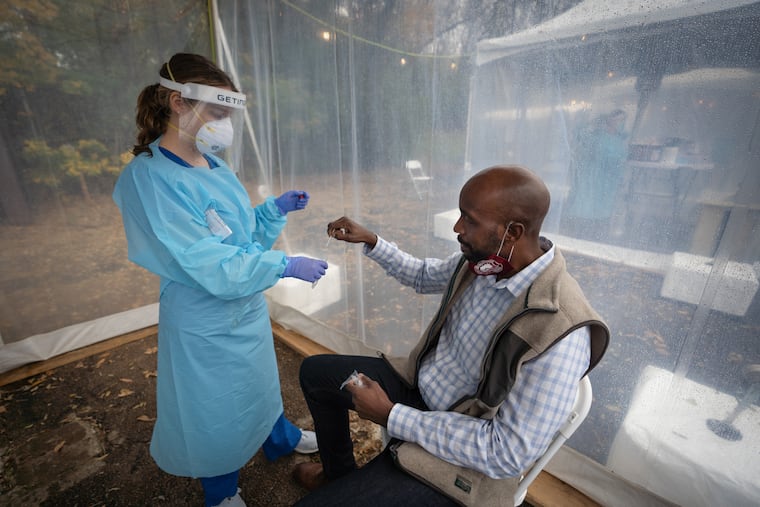Philadelphia’s weekly average for COVID-19 positive tests jumps 5-fold; Pa., N.J. case hitting pandemic highs
Philadelphia daily averages likely will go higher as positive-test reports reach new highs.

Hospitalizations are up on both sides of the Delaware River and around the nation, positive tests are at pandemic highs, and on Wednesday a disheartening resurgence showed that the coronavirus had absolutely no intention of relenting deep into its eighth month of redefining life in America.
“We are entering the most dangerous phase of this pandemic,” said Philadelphia Health Commissioner Thomas Farley, “and everyone — everyone — needs to take this seriously.”
Philadelphia’s weekly average of daily positive tests was more than 5½ times higher than it was two months ago, according to an Inquirer analysis of data available through Saturday.
And it is likely to be higher in future updates: In just the last two days, based on recent test results, the city reported more than 1,600 cases.
Pennsylvania reported 4,711 positive cases Wednesday, a pandemic high and surpassing the 4,000 plateau for the second consecutive day.
New Jersey’s numbers, per capita, were similar: It added more than 3,000 positive tests for a second straight day.
» READ MORE: ‘This is not the time to go outside your bubble,’ Black Doctors COVID-19 Consortium leader says
Among those who have tested positive is a member of state Attorney General Gurbir S. Grewal’s staff, and Grewal announced that he would be in quarantine at home. His office said that test results were conflicting but that Grewal was asymptomatic.
In all, the coronavirus has been blamed for killing more than 235,000 Americans, including more than 9,000 in Pennsylvania and close to 15,000 in New Jersey, according to Johns Hopkins University. About 3% of the population, 10 million people, have tested positive.
Among the alarming signs of the resurgence is an increase in hospitalizations, reaching an all-time high this week across the nation. According to the COVID Tracking Project, over 60,000 people were hospitalized with COVID-19 symptoms, double the September number.
In Pennsylvania and New Jersey, the hospital figures were more than double October’s.
“The numbers are rising. Take this seriously, folks,” Gov. Phil Murphy wrote on Twitter. “Wear a mask. Social distance. Stay safe."
The virus has hit Delaware County’s Department of Emergency Services, which is confronting personnel shortages. As many as 10 of its 130 staffers at the 911 call center are missing daily because they’ve either tested positive or have come in contact with someone who has, officials said Wednesday.
It’s also getting in the way of training new people: Doing it online just isn’t the same, and it’s hard to conduct hands-on training with a socially distanced dispatcher.
These days, however, online learning has become a way of life for many people.
» READ MORE: CHOP recommends Philly-area schools close amid coronavirus surge: ‘We are in a catastrophic situation’
Given the regional surge, it might be time for all the region’s pupils to stay at home for a while, in the view of an influential research team at Children’s Hospital of Philadelphia. “Increasing evidence” points to the virus being transmitted in schools around the area, Dr. David Rubin, director of CHOP’s PolicyLab, said in an interview Wednesday.
Montgomery County health officials are considering ordering schools in the county to go virtual for two weeks beginning Nov. 23.
Philadelphia officials have said they are considering new restrictions to slow the spread of the virus, but Farley acknowledged a complication: Most transmission is occurring at private family and social gatherings.
Some colleges suspect that Halloween parties might have caused spikes in COVID-19 cases. Pennsylvania State University’s active case total rose from 232 last Friday to 275 Tuesday.
“We believe that some of the increases are tied to gatherings over Halloween weekend, and we are working closely with students on contact tracing to limit further spread of the virus,” president Eric J. Barron said in a statement.
» READ MORE: This Penn scientist paved the way for the Pfizer COVID-19 vaccine
It was uncertain precisely what was driving the alarming Philadelphia numbers. The Inquirer analysis of data through Saturday showed a weekly average of 529 new cases daily, compared with 93 on Sept. 7.
More than 50,000 Philadelphians have tested positive for the virus as of Wednesday. Three more deaths were confirmed, and about half of the 1,904 coronavirus-related fatalities have involved residents of long-term facilities.
Farley has urged residents to stay at home and wear masks in the presence of those outside their own household.
“Stay away from others," he said Wednesday, “and wear a mask.”
Staff writers John Duchneskie, Maddie Hanna, Laura McCrystal, Robert Moran, Susan Snyder, and Vinny Vella contributed to this article.